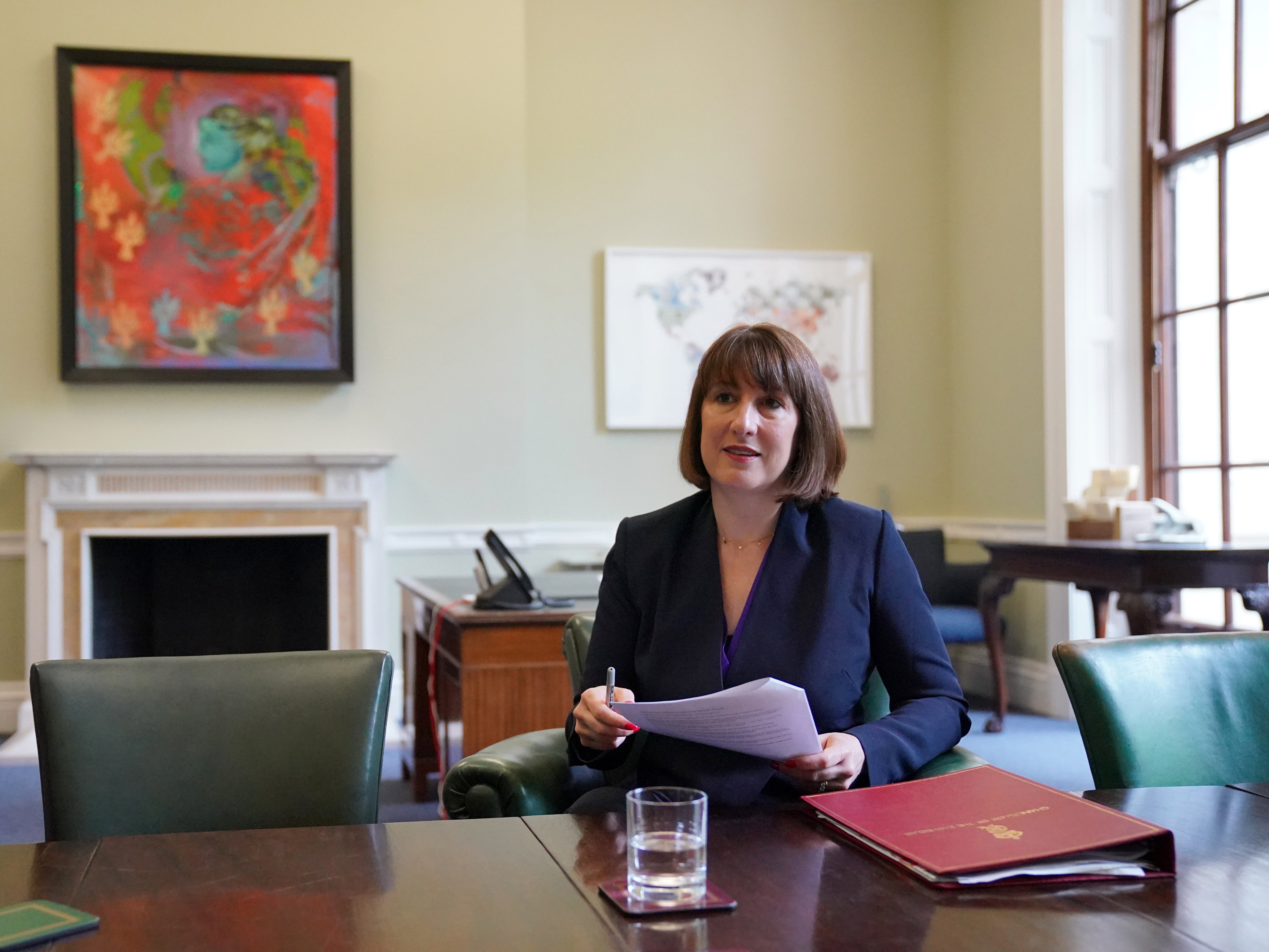Keir Starmer will ‘embrace harsh light of fiscal reality’ ahead of Budget
The prime minister will warn of ‘unprecedented’ economic challenges as he delivers a speech in the West Midlands today
Your support helps us to tell the story
From reproductive rights to climate change to Big Tech, The Independent is on the ground when the story is developing. Whether it's investigating the financials of Elon Musk's pro-Trump PAC or producing our latest documentary, 'The A Word', which shines a light on the American women fighting for reproductive rights, we know how important it is to parse out the facts from the messaging.
At such a critical moment in US history, we need reporters on the ground. Your donation allows us to keep sending journalists to speak to both sides of the story.
The Independent is trusted by Americans across the entire political spectrum. And unlike many other quality news outlets, we choose not to lock Americans out of our reporting and analysis with paywalls. We believe quality journalism should be available to everyone, paid for by those who can afford it.
Your support makes all the difference.The prime minister is to warn of “unprecedented” economic challenges as he warns of the “harsh light of reality”, in a doomladen speech ahead of the Budget this morning.
The Budget will embrace the “harsh light of fiscal reality” but “better days are ahead”, Sir Keir Starmer will say in a speech ahead of one of the most significant financial statements in recent history.
With chancellor Rachel Reeves expected to bring in some of the highest tax rises in history to cover a £40 billion black hole in Labour’s spending plans, the Prime Minister will appeal to the public to judge him on his ability to rise to the challenges as he sets the tone for Wednesday’s announcement.
Sir Keir’s speech in the West Midlands - a region which Labour swept away the Tories in the election earlier this year - comes amid widespread speculation that Ms Reeves is set to raise taxes by between £25 billion to £40 billion.

The chancellor is now expected to increase employer contriibutions to national insurance by 2 per cent despite promising not to increase national insurance in the Budget. There are also expected to be hikes in inheritance tax and capital gains. She has pledged not to increase “taxes on working people” including income tax, employee contributions to national insurance or VAT.
In his speech Sir Keir is expected to promise the Budget will “ignore the populist chorus of easy answers” amid a series of expected tax hikes, including an increase to employer national insurance by at least one percentage point.
Referring to the statements announced by New Labour’s Gordon Brown and austerity-era Conservative chancellor George Osborne, Sir Keir will say: “We have to be realistic about where we are as a country. This is not 1997, when the economy was decent but public services were on their knees.
“And it’s not 2010, where public services were strong, but the public finances were weak. These are unprecedented circumstances.
“And that’s before we even get to the long-term challenges ignored for 14 years: an economy riddled with weakness on productivity and investment, a state that needs urgent modernisation to face down the challenge of a volatile world.”
The prime minister is expected to say he will not offer the UK’s problems as “an excuse”, adding: “Politics is always a choice. It’s time to choose a clear path, and embrace the harsh light of fiscal reality so we can come together behind a credible, long-term plan.”
It comes amid opposition accusations of hypocrisy over an expected decision to extend a freeze on income tax thresholds introduced under the Tories, and confusion over the Labour Government’s use of the term “working people”.

The party had promised in its manifesto that it would not increase taxes on working people – explicitly ruling out a rise in VAT, national insurance and income tax.
But ministers have since come under pressure to spell out who falls within this term after Sir Keir suggested those who make money from assets such as property would not meet the definition.
Ahead of Sir Keir’s speech, chancellor of the Duchy of Lancaster Pat McFadden told Times Radio that the Budget will “be the most honest” ever given the situation facing the government.
He said: “We’re facing up to a difficult situation. It’s important that we levelled with people. There’s no point in telling people, ‘everything’s absolutely fine’, when the prison system is in a state of collapse, when NHS waiting lists are at a record high, when we’ve got crumbling schools.
“There’s so much that’s wrong that we’ve got to fix. And it’s important to set that out honestly and candidly for the public. I think we’ll have the most honest budget on Wednesday that we’ve had for some years.”
Education Secretary Bridget Phillipson sought to offer reassurances that working people would not see higher taxes “on their payslip” as she faced broadcasters on Sunday morning.
But critics have argued that employees will still face a greater burden as the Chancellor is expected to extend the freeze on income tax thresholds, which sees people pulled into paying higher rates through a phenomenon known as “fiscal drag”.
On Sunday Ms Phillipson acknowledged frustrations over ministers’ refusal to confirm who will be hit by greater levies in the Budget but declined to “speculate” on changes that will come on Wednesday.
Other measures expected in the statement include a cut to the earnings threshold at which employers pay national insurance.
Combined with a hike in the rate of employer contributions, this is expected to raise around £20 billion as Ms Reeves seeks to revive public services and put the economy on a firmer footing.
Some £1.4 billion has been announced already to rebuild crumbling schools, as well as a tripling of investment in free breakfast clubs, £1.8 billion for the expansion of Government-funded childcare, and £44 million to support kinship and foster carers.
Ministers have vowed there will be no return to austerity, but Ms Reeves is understood to have called on Government departments to make efficiency savings of 2% in order to free up “billions” of pounds that would be reinvested in the front line.
The Chancellor will also confirm a change to the UK’s debt rule that will open the door for the Government to spend billions more on infrastructure, such as replacing dilapidated buildings on the public sector estate.
She is expected to target public sector net financial liabilities (PSNFL) as her new measure of debt rather than the current yardstick of underlying public sector net debt.
A shift to PSNFL would give her greater headroom to meet her debt reduction target because it includes a wider mix of state assets and liabilities – notably including expected student loan repayments to offset some of the liability.
Sources have said the Chancellor is seeking to find up to £40 billion in tax hikes and spending cuts in order to avoid a return to austerity in next Wednesday’s fiscal statement.
Ms Reeves has admitted she will raise some taxes, pointing to a £22 billion black hole in the public finances which ministers say was left behind by their Tory predecessors, but has not specified which ones.
Capital gains tax, inheritance tax and fuel duty are among some of the other levers she could pull to raise revenue.
The Prime Minister will say the Budget will be underpinned by a commitment to stability when he speaks on Monday.
“It’s stability that means we can invest, and reform that will maximise that investment,” Sir Keir is expected to say.
“Stability, investment, reform. That’s how we fix the NHS, rebuild Britain and protect working people’s payslips. Delivering on the mandate of change.”
He will challenge critics to offer an alternative to Labour’s plans and explain which public services should be cut instead.
“It’s time we ignored the populist chorus of easy answers… we’re never going back to that,” the Prime Minister will say.
“If people want to criticise the path we choose, that’s their prerogative. But let them then spell out a different direction.
“This is what fixing the foundations and delivering change means. Everyone in this country will benefit from this. Everyone can wake up on Thursday and understand that a new future is being built, a better future.”
Writing in the Mirror, he asked the public to “judge us by whether, in five years’ time, you have more money in your pocket.”
The Tories described Sir Keir’s words as “hollow” and accused the Government of “broken promises” over expected tax rises.
“The Prime Minister has some gall if he thinks the British public will swallow the nonsense he is spewing,” a Conservative spokesman said.